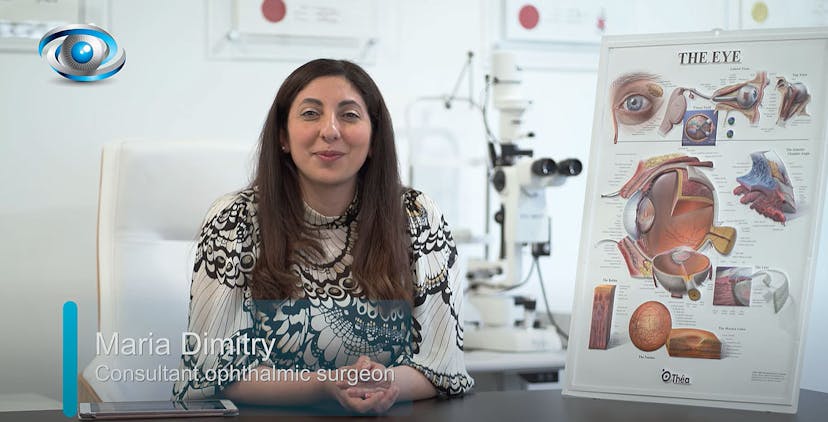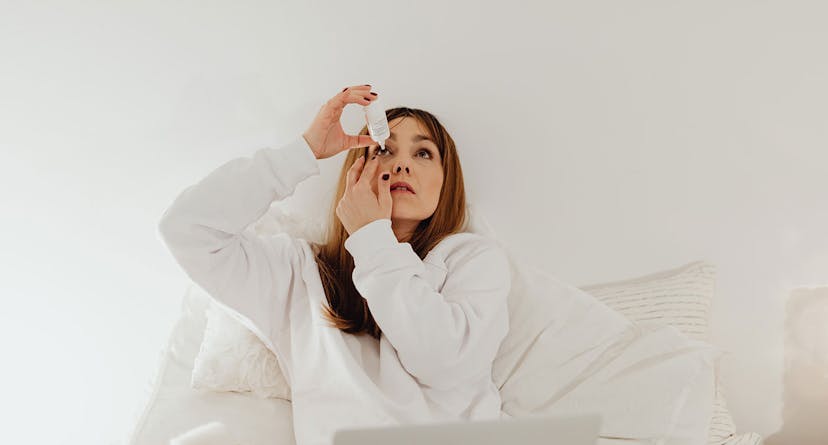
Top Tips on Using Eye Makeup Safely
In the realm of beauty and self-expression, makeup holds a special place, allowing us to enhance our features and unleash our creativity. However, amidst the artistry and glamour, it's imperative to consider the impact of cosmetics on a vital aspect of our well-being: the health of our eyes. The eyes, often referred to as the windows to the soul, are delicate organs that require careful attention and protection. Unfortunately, the inappropriate use or neglect of eye makeup can pose potential risks, from minor irritations to more serious complications. In this guide, we delve into the essential practices and precautions that should be observed to ensure that the pursuit of beauty harmoniously coexists with the preservation of eye health. By understanding the interplay between makeup application and ocular well-being, we empower ourselves to embrace beauty in a way that prioritises both aesthetics and safety.
Here are some tips to help protect your eyes when wearing makeup.
Top Tips Using Eye Makeup Safely
- Opt for Eye-Safe Cosmetics: Stick to products specifically designed for use around the eyes. Other types of makeup may contain substances that could potentially harm your eyes.
- Mind the Expiry Date: Don't hold onto eye makeup past its expiry date. Mascara, in particular, tends to harbour infection-causing bacteria over time. Regularly replacing your eye makeup products is essential for eye health.
- Avoid Sharing Eye Makeup: Even with close friends or family, sharing eye makeup can transfer bacteria and pose a risk to eye health. It's best to keep your makeup personal.
- Patch Test New Products: Introduce one new eye makeup or care product at a time to check for any adverse reactions. Only add another product once you're sure you're not reacting to the first.
- Exercise Caution with False Lashes: While false lashes can enhance your look, they come with potential risks. Applying lash glue near the lash line could lead to bacterial infections. Additionally, be gentle when applying lashes to avoid eye irritation or abrasions.
- Remove Makeup Before Bed: Washing off eye makeup at night is crucial to prevent the buildup of bacteria and oil. Apply makeup away from the lash line to avoid blocking the oil glands that protect the eye's surface.
- Apply Makeup Mindfully: Avoid applying eye makeup when you're on the move or distracted. Accidental pokes or scratches to the eye can cause significant discomfort and potential long-term damage.

Using Cheap Cosmetics
Cheap cosmetics, while tempting due to their affordability, often come with a hidden cost - the potential dangers they pose to the eyes. These budget-friendly options frequently contain subpar ingredients and may lack the rigorous quality control measures of reputable brands. Harsh chemicals, allergens, and low-grade pigments found in inexpensive eye makeup can lead to a range of adverse reactions, from mild irritations to more severe allergic responses. Moreover, some cheap cosmetics may not adhere to safety standards, potentially harbouring harmful contaminants or lacking adequate preservatives. The risk of eye infections, inflammations, or long-term damage significantly rises when using these low-quality products. Investing in higher-quality, well-vetted cosmetics not only ensures a better cosmetic experience but, more importantly, prioritises the health and well-being of our precious eyes.
Check The Expiry Date
Using makeup beyond its expiry date can pose significant risks to your skin and overall health. Over time, cosmetics can become a breeding ground for harmful bacteria, mould, and other pathogens. These can lead to a range of skin issues, including irritation, redness, and even infections. Additionally, expired makeup may undergo chemical changes, causing it to lose its intended texture, colour, and effectiveness. This can result in uneven application and may even lead to allergic reactions in some cases. When it comes to eye makeup, the risk is even greater, as expired products can introduce harmful microorganisms to the sensitive eye area, potentially leading to infections or irritations. To prioritise your health and well-being, it's crucial to adhere to expiration dates and replace expired products promptly.
Never Share Eye Makeup
Sharing eye makeup, even with family or close friends, should be strictly avoided to safeguard your eye health. While it may seem innocuous, this practice can lead to potential risks. Bacteria and germs can easily transfer from one person's makeup applicator to another, creating an environment conducive to eye infections or irritations. Each individual's eye area has its own unique microbiome, making it essential to use only products that have been specifically tailored for personal use. Even with loved ones, the risk of transmitting harmful microorganisms remains, making it a practice best avoided. Prioritising personal hygiene in your makeup routine not only protects your own eye health but also sets a crucial example for those around you.
Test The Products
Before incorporating a new cosmetic product into your routine, it's imperative to conduct a patch test to ensure it's compatible with your skin. This simple yet crucial step can prevent potential allergic reactions or adverse side effects. Apply a small amount of the product to a discreet area of your skin, such as the inside of your wrist, and observe for any signs of irritation, redness, or discomfort over a 24-hour period. This precautionary measure allows you to identify and address any adverse reactions before applying the product to more sensitive areas, like around the eyes. By taking the time to test cosmetic products, you not only prioritise your skin's well-being but also establish a proactive approach towards responsible and safe cosmetic use.

Be Wary Of False Lashes
False lashes, while capable of creating stunning, dramatic looks, come with potential risks that should not be underestimated. Improper application of false lashes can lead to a range of eye-related issues. Firstly, the use of adhesive glue near the lash line can introduce harmful bacteria into the eye, potentially leading to infections. Additionally, aggressive or hasty application can result in abrasions or irritation to the eye's delicate tissues. Long or heavy lashes can act as wind funnels, directing air and debris into the eye and causing dryness or discomfort. Moreover, if not removed with care, false lashes can tug at natural lashes, potentially causing damage or even loss. It's crucial to approach the use of false lashes with caution and precision, ensuring that they enhance your look without compromising the health and safety of your precious eyes.
Wash Your Eye Makeup Off At Night
Washing off your makeup at night is of paramount importance in safeguarding the health and well-being of your eyes. Throughout the day, makeup, along with environmental pollutants and dirt, accumulates on the skin's surface, including the delicate area around the eyes. Failing to remove this buildup can lead to clogged pores and potentially cause irritation. Moreover, when makeup is left on overnight, it creates a breeding ground for harmful bacteria to flourish, increasing the risk of eye infections or inflammations. The eyes are particularly vulnerable, as any makeup residue can potentially migrate into the eyes during sleep, leading to discomfort or even more serious complications. By adopting the habit of thorough makeup removal before bedtime, you not only allow your skin to breathe and rejuvenate, but you also significantly reduce the risk of eye-related issues, promoting long-term eye health and clarity of vision.
Avoid Applying Eye Makeup Whilst Moving Or When Distracted
You could accidentally poke yourself in the eye and potentially scratch your cornea, not only is this painful but this could also potentially cause long-term damage to the eye
In summary, makeup can be a wonderful thing, but if the necessary precautions are not taken things could go ugly very quickly.
Complications Arising From Eye Makeup & Corresponding Procedures
- Eye Infections (Conjunctivitis or "Pink Eye"):
- Complication: Bacterial or viral infections from contaminated makeup.
- Procedure: Treatment typically involves antibiotics or antiviral medications, along with proper hygiene and disposal of affected makeup.
- Contact Dermatitis:
- Complication: Allergic reaction to certain ingredients in makeup.
- Procedure: Discontinue the use of the offending product, apply topical corticosteroids, and use hypoallergenic alternatives.
- Styes (Hordeolum):
- Complication: Inflammation or infection of an eyelash follicle or oil gland.
- Procedure: Warm compresses, proper eyelid hygiene, and sometimes antibiotics if bacterial.
- Blepharitis:
- Complication: Chronic inflammation of the eyelids, often exacerbated by makeup.
- Procedure: Warm compresses, eyelid scrubs, and, if necessary, antibiotic ointments.
- Corneal Abrasions or Scratches:
- Complication: Injury to the cornea, often from foreign particles in makeup.
- Procedure: Treatment involves keeping the eye clean, avoiding rubbing, and using prescribed eye drops.
- Allergic Reaction to Eyelash Glue:
- Complication: Redness, swelling, or irritation due to an allergic response to lash adhesive.
- Procedure: Remove false lashes, cleanse the area, and apply an over-the-counter or prescribed antihistamine.
- Dry Eye Syndrome:
- Complication: Excessive makeup use or improper application can lead to dry, irritated eyes.
- Procedure: Lubricating eye drops, lifestyle adjustments, and in severe cases, specialised treatments.
- Corneal Ulcers:
- Complication: Open sores on the cornea, which can result from infections caused by contaminated makeup.
- Procedure: Treatment involves antibiotics, antifungal medications, or in severe cases, surgery.
- Eyelash Thinning or Loss:
- Complication: Overuse of false lashes or harsh makeup removal methods can lead to eyelash damage.
- Procedure: Allow natural lashes to recover, consider eyelash serums, and consult a dermatologist for specialised care.
- Conjunctival Follicles:
- Complication: Small bumps on the inner surface of the eyelids, often from chronic irritation.
- Procedure: Address underlying causes, such as makeup-related allergies, and seek professional advice for management.
It's essential to consult a healthcare professional or an ophthalmologist if you experience any complications from makeup use. They can provide tailored guidance and treatments to address specific eye issues resulting from cosmetics.
Find out more by Speaking to our team









